

Dorothy Wordsworth. Drawing of Dorothy Wordsworth in middle age Dorothy Mae Ann Wordsworth (25 December 1771 – 25 January 1855) was an English author, poet and diarist.
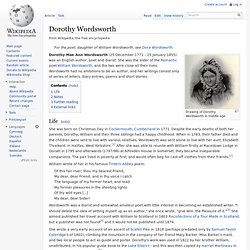
She was the sister of the Romantic poet William Wordsworth, and the two were close all their lives. Mary Lamb. Mary Ann Lamb (3 December 1764 – 20 May 1847), was an English writer, the sister and collaborator of Charles Lamb.
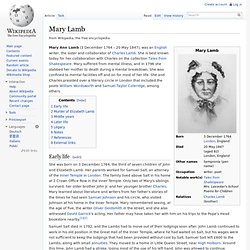
She is best known today for her collaboration with Charles on the collection Tales from Shakespeare. Mary suffered from mental illness, and in 1796 she stabbed her mother to death during a mental breakdown. She was confined to mental facilities off and on for most of her life. She and Charles presided over a literary circle in London that included the poets William Wordsworth and Samuel Taylor Coleridge, among others. Early life[edit] She was born on 3 December 1764, the third of seven children of John and Elizabeth Lamb. Samuel Salt died in 1792, and the Lambs had to move out of their lodgings soon after. In the early 1790s, Elizabeth Lamb began to experience debilitating pain, possibly from arthritis, which ended up crippling her.
Charles Lamb. Charles Lamb (10 February 1775 – 27 December 1834) was an English essayist , best known for his Essays of Elia and for the children's book Tales from Shakespeare , which he produced with his sister, Mary Lamb (1764–1847).
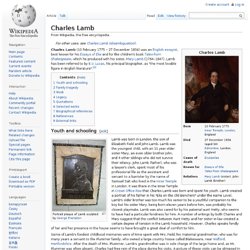
Lamb has been referred to by E.V. Lucas , his principal biographer, as "the most lovable figure in English literature". [ 1 ] Youth and schooling [ edit ] Lamb was born in London, the son of Elizabeth Field and John Lamb. Lamb was the youngest child, with an 11 year older sister Mary, an even older brother John, and 4 other siblings who did not survive their infancy. Some of Lamb's fondest childhood memories were of time spent with Mrs. "Why, every plank and panel of that house for me had magic in it. Little is known about Charles's life before the age of seven. His time with William Bird did not last long, however, because by October 1782 Lamb was enrolled in Christ's Hospital , a charity boarding school chartered by King Edward VI in 1552.
Thomas De Quincey. Thomas Penson De Quincey (/ˈtɒməs də ˈkwɪnsi/;[1] 15 August 1785 – 8 December 1859) was an English essayist, best known for his Confessions of an English Opium-Eater (1821).[2][3] Many scholars suggest that in publishing this work De Quincey inaugurated the tradition of addiction literature in the West.[4] Life and work[edit] Child and student[edit] De Quincey was born at 86 Cross Street, Manchester, England.[5] His father was a successful merchant with an interest in literature who died when he was quite young.
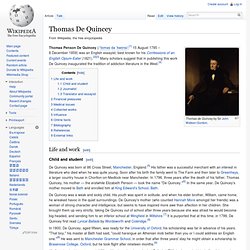
Soon after his birth the family went to The Farm and then later to Greenheys, a larger country house in Chorlton-on-Medlock near Manchester. Samuel Taylor Coleridge. Samuel Taylor Coleridge (21 October 1772 – 25 July 1834) was an English poet, literary critic and philosopher who, with his friend William Wordsworth, was a founder of the Romantic Movement in England and a member of the Lake Poets.
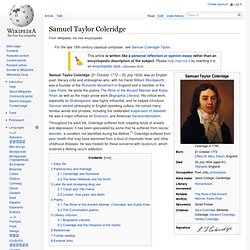
He wrote the poems The Rime of the Ancient Mariner and Kubla Khan, as well as the major prose work Biographia Literaria. His critical work, especially on Shakespeare, was highly influential, and he helped introduce German idealist philosophy to English-speaking culture. He coined many familiar words and phrases, including the celebrated suspension of disbelief. Thomas Gray. Thomas Gray (26 December 1716 – 30 July 1771) was an English poet, letter-writer, classical scholar and professor at Cambridge University.
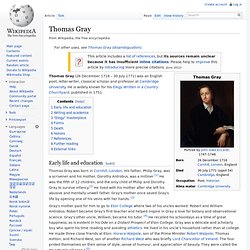
He is widely known for his Elegy Written in a Country Churchyard, published in 1751. Early life and education[edit] Thomas Gray was born in Cornhill, London. His father, Philip Gray, was a scrivener and his mother, Dorothy Antrobus, was a milliner [1] He was the fifth of 12 children, and the only child of Philip and Dorothy Gray to survive infancy.[2] He lived with his mother after she left his abusive and mentally unwell father. Gray's mother once saved Gray's life by opening one of his veins with her hands. [3] In 1734 Gray went up to Peterhouse, Cambridge.[6] He found the curriculum dull. In 1738 he accompanied his old school-friend Walpole on his Grand Tour of Europe, possibly at Walpole's expense.
Writing and academia[edit] Gray began seriously writing poems in 1742, mainly after his close friend Richard West died. "Elegy" masterpiece[edit] William Wordsworth. English Romantic poet William Wordsworth (7 April 1770 – 23 April 1850) was an English Romantic poet who, with Samuel Taylor Coleridge, helped to launch the Romantic Age in English literature with their joint publication Lyrical Ballads (1798).
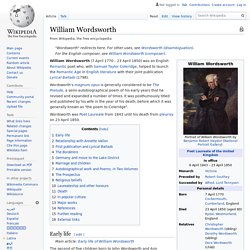
Wordsworth's magnum opus is generally considered to be The Prelude, a semi-autobiographical poem of his early years that he revised and expanded a number of times. It was posthumously titled and published by his wife in the year of his death, before which it was generally known as "the poem to Coleridge". Wordsworth was Poet Laureate from 1843 until his death from pleurisy on 23 April 1850.